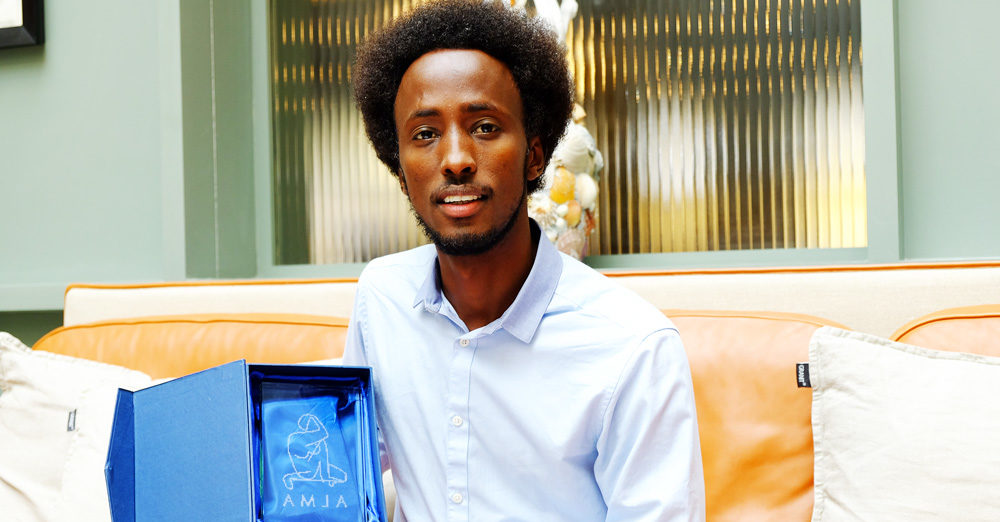Jimale Mohamed is one of the winners of the 2018 Alma New Award. He received it for Ari.Farm – an app that you can use to invest in camel milk in Somalia. What is it exactly about and how does it work? SIANI took some time to speak to Jimale Mohamed about Ari.Farm and about his unique journey.
When you first meet Jimale you sense his energy immediately. He was born into a nomadic family in central Somalia, where he lived until he was about 12 when he headed to the capital Mogadishu to go to school. He then went on to study IT in India and by the time he came back to Somalia, the country had fallen into conflict. By 2010 Jimale had arrived in Sweden as a refugee.
“When I came to Gällivare, a small Arctic town in the Swedish Lapland, in February, it took me less than 24hrs to realise that my future lays elsewhere. I was 25 years old with dreams and aspirations and freezing wasn’t one of them.”
He moved to Fagersta, located in central Sweden, to study Swedish. Whilst there, he started the influential blog somaliska.com which he sold in 2016 when he started Ari.Farm. By this time, he was living in Enköping, closer to Stockholm’s buzz and action.
2016 was a tough year for Somalia. Droughts shrivelled most of the country, devastating communities. The diaspora set up many charities to support those in need, but Jimale didn’t want to start a charity. Instead, he came up with a way to leverage his IT skills for the benefit of his countrymen. That’s when Ari.Farm was born.
It started with a simple concept – buying and selling goats in Somalia. You buy and sell at the market rate and (hopefully) make some money. Now, you can follow your goat through the app. You can also buy sheep and lease camels, getting a 5% dividend on milk sales every 3 months for up to 18 months (when the camel normally stops producing milk). At this point you can sell it again or keep it as a remote pet. The camels are based on farms near Mogadishu, Somalia.
Between the three locations, 20 people are now employed by Ari.Farm, most of them are drawn from ex-nomad groups. who find it hard to integrate into other areas, because of a lack of education opportunities. Ari.Farm had over 300K USD in purchases made through the app since it went live, entirely through word of mouth. His business has not received any start-up funding – a pretty unique achievement in this ecosystem. Currently 20 new users sign up daily, adding to our user base of 3400 people. The business is scalable with demand; Jimale specifically cites that the market for camel milk is the easiest to grow: “Camels are our most popular product at the moment, they provide regular dividends over a sustained period and it makes them an attractive option for our users.”
Jimale is thoughtful when asked about his motivations for continuing to expand the business:
“I want to create a new generation of farmers, and to show to the former nomads that farming is a profitable enterprise and a good livelihood strategy. When people work with us, they build up new technical knowledge which they can use to set up their own farms.”
The next development with Ari.Farm is greenhouses. The start-up is currently building 1000 sqm space which can be leased in plots of 20 sqm over 18 months. Like with the camels, the leaseholder gets a dividend from what is produced on the plot over time. The lease covers costs for planting, tending, harvesting and salaries to employees, before profits start to emerge. Ari.Farm set up the greenhouses in Somalia and plans to expand to Kenya and Ethiopia.
“There is a strong demand for basic vegetables like tomatoes in these regions, where it’s difficult to grow without investment. The greenhouses will benefit the people in the regions through reliable supply of vegetables and create jobs”
What’s impressive with Ari.Farm is that the food tech sector (as it exists in Sweden) is almost entirely separated from rural and international development. Jimale has developed a concept that is unique in its ability to engage conscious consumers in over 40 countries whilst directly benefiting those in East Africa.
Ari.Farm is available on iOS, android and as a web app.
Thanks to Alma for providing the venue for the interview.
